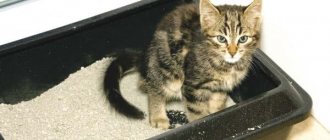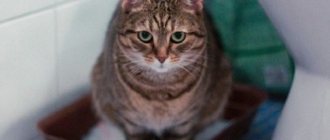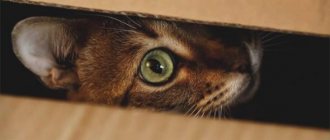It happens in life that an adult cat went to the litter box and then stopped. While some try to yell at their pets for such misdeeds, others patiently wipe the floor, philosophically saying, “What can we do?” But there is always a reason for everything. It’s just that sometimes we cannot determine it, because... it is not obvious. But the problem can be easily fixed.
The Murkotiki website has compiled the most complete list of factors that lead to the fact that a cat begins to go not in the litter box, but in the corners, in the bathroom, in the sink, in slippers, or even on the bed. So, why doesn’t the cat go to the litter box and what to do about it?
Article continues after advertisement
Reason No. 2: not satisfied with the place
Any living creature feels vulnerable during urination or defecation. But if you understand that there is no threat in the apartment, then the cat does not understand. He is driven by the ancient instinct of self-preservation. Some cats can do their business in front of everyone right in the middle of the room, moreover, at this moment they need company. Others are so anxious that they only want to go to the toilet in a secluded place. If your cat is like this, try to place the litter box away from walk-through areas and buy a house tray.
How to stop a cat from walking past the toilet
If the cat starts peeing anywhere, veterinarians recommend:
- Thoroughly wash soiled areas with disinfectants. Animals have an excellent sense of smell, so the remaining smell will attract them to mess up again and again.
- Place strong-smelling spices (pepper, cloves, cardamom) or orange peels on “problem” areas. The pungent aroma should stop the cat from urinating in the same place.
- Place double-sided tape on the floor/furniture/table and other household items that are within your pet’s circle of “interests”. He will be uncomfortable and afraid to step on the sticky surface, which means that the desire to mark the territory there will disappear.
- Place a bowl of food where the cat gets into the habit of going to the toilet. Animal psychology is designed in such a way that they always urinate and eat in different places.
- Use special sprays that are sold in pet stores. They discourage cats from defecating outside the litter box.
- Wipe the cat's face with a rag, and then wipe the surface where he got into the habit of shitting with the same cloth. Approaching the place of his “crimes,” the pet will hear its own smell and will not want to urinate there.
- During periods of long absence, leave a spare tray. If the main litter box becomes so dirty that your cat starts to ignore it, she can switch to a clean box.
And the most important thing to remember is no assault or rude attitude. Physical impact can have the opposite effect, and the animal will simply begin to take revenge. More affection, attention and patience, and it is likely that the cat will quickly accept the established rules and try not to break them.
Reason No. 3: not satisfied with the filler
Did your cat stop going to the litter box after changing the litter? Then the reason is obvious: the new filler did not suit him. Cats prefer clay clumping litters. Other options may not be recognized if you are not accustomed to them from childhood.
Moreover, cats do not like toilets without any filler at all, because... They don’t see the difference between the floor and the tray: they are equally smooth, so what’s the difference then? Therefore, the tray must contain at least some bad filler.
It is not advisable to change the type of litter if the cat is already accustomed to a specific one. Smelling a different smell or seeing a different consistency, she may think that this place has become unsuitable for the toilet, and will go in search of a new one. Similarly, by the way, the cat will decide if you use aggressive products that leave a pungent odor when washing the tray. You may not feel it, but the “aroma” will hit your cat’s nose. Use soap that washes off easily and leaves no odor.
Complications associated with declawing
Please never have your cat declawed. However, if you have a cat that has already been declawed, this could very well be the reason why she is urinating outside the litter box.
Declawing involves removing the last bone on each toe. The joint is severed and the claw is removed along with the last bone to which it is attached. This extremely painful operation causes permanent complications in many cats.
Nerve damage is a common problem, and early osteoarthritis often occurs.
DO NOT DO THAT.
When a cat steps on gritty litter, it can irritate the operated paws and cause pain. If your cat is declawed and doesn't like the litter box, take her to the vet to be examined for osteoarthritis, phantom pain, or other problems that may arise days or years after surgery.
There are things your veterinarian can do to relieve the pain. Also try to choose a filler with a softer texture.
Reason #4: the cat doesn’t get into the litter box
Do you find shit and urine near the tray? Or does the cat just shit next to the litter box? It would seem, what kind of animal is this that knows its place, but walks by in a small way or in a big way? What kind of pest? Perhaps he did not want to do dirty tricks at all. Think about whether the tray size is sufficient? If the cat does not fit into the tray and cannot turn around freely, he pees and poops by. Try replacing the tray with a wider one, with higher sides, or even a house tray. Read our review on how to choose a litter box for your cat.
General recommendations: how to make the tray the most attractive place for the toilet?
Thoroughly clean the entire house of cat dirt using special odor-eliminating products. After all, it is its own excellent smell that makes the cat come back and shit in the same places. In places that are extremely undesirable for “cat dirty tricks”, it is necessary to place bowls with cat food. You can also take pieces of cardboard and glue literally a few granules of dry cat food onto them and place them throughout the house, except in places in close proximity to the litter box. Your cat is unlikely to poop in these areas due to the aforementioned innate instinct. Don't forget to add paper stained with cat urine to the litter tray to reinforce the association with a latrine.
Reason No. 5: the cat does not want to go into a dirty litter box
Many cats are terrible tidies: they will not go into a litter box that they have already used and which you have not had time to clean up. Likewise, they will not go to a toilet that has to be shared with another pet. If you are lucky and your cat is like this, you will have to constantly monitor the cleanliness of the toilet.
There are also clean people who like to go to one tray when they need a lot, and to another when they need a little. In this case, you will need two trays and place them close to each other.
Article continues after advertisement
Do not use punishment or physical force
In the case of cats, it is pointless to act with force, since they are not able to make a logical connection between punishment and action if a certain time has already passed. Poking your cat's nose into a puddle will only make her afraid of you, but will not wean her from the habit.
Due to their age, kittens may not remember the location of the tray, or simply may not have time to reach it. To prevent undesirable behavior from becoming ingrained in them, it is necessary to correct their mistakes in a timely manner and do everything possible to ensure that the kitten has time to get to the toilet.
Cats that live outside need some time to adapt to the rules of their new home. The best option in this situation is to limit the pet’s movement space to one room, or temporarily place it with a tray in a spacious cage. It will be very useful if you also use clay litter, since it will remind the cat of the earth.
Reason #6: stress
Stressed cats can also experience toilet misfires. For example, a new person/animal appeared in the family or someone died, you moved to another apartment or rearranged the furniture, you became pregnant or began to pay less attention to the cat. These are all reasons for concern. Cats are very sensitive and may start walking past the litter box due to their worries. In this case, you need to try to identify and eliminate the cause of stress, calm the cat, and pay more attention to it. In especially severe cases, cat sedatives will be needed.
Reason #7: the cat is in pain
In a situation where your pet has been consistently going to the litter box all his life, and then suddenly stops, you should first of all suspect a disease that causes him pain and discomfort when urinating or defecating. This could be, for example, cystitis or urolithiasis. Cats are not very intelligent creatures, and therefore they sometimes blame the tray for the appearance of pain and think that if they change the place, the pain will go away.
Urolithiasis is not a death sentence, but a serious diagnosis. The earlier treatment is started, the greater the chance of remission. Watch the cat for several days. Maybe he's peeing blood? Maybe he meows plaintively before or after bowel movement? Maybe he only pees by the tray and poops in it? All this should be alarming. But in any case, you should go to the veterinarian, because... Urolithiasis can develop without noticeable symptoms.
You should especially worry if a neutered cat stops going to the litter box, because... Neutered men have a several-fold increased risk of developing urolithiasis. This applies specifically to cats, not cats.
After treatment begins, the pet will recover, and the pain will disappear - and the animal will most likely return to the litter box. However, a medical problem can turn into a behavioral one: at first the cat thought that the tray was to blame for the pain, so he started going in the wrong place - and the pain disappeared (due to treatment, but he does not understand this). Therefore, the cat thinks that his tactics of changing places worked. And now we need to eliminate the behavioral problem. Buy a new tray, put good litter in it, place the toilet in a different place (for example, in the one the cat has chosen): let him not associate the new toilet attributes with the old ones and do not think that they can cause unpleasant sensations.
Disease
When cats relieve themselves outside the litter box, in most cases it is due to a medical problem. Although bacterial bladder infections are not common in cats, "idiopathic" urinary tract problems are very common. They are most often caused by high urine pH, which leads to the formation of struvite crystals in the urine.
The crystals make tiny cuts in the lining of the urinary tract, leading to inflammation and a burning sensation.
If left untreated, the crystals can form a partial or complete blockage, which can quickly lead to death due to toxicity as urine cannot be eliminated from the body. Plus it's very painful. A cat may avoid the litter box because it associates it with pain.
As with all medical cases or when you think something is wrong, you should take your cat to the vet and have them run a urine test to check for these problems (request a complete urinalysis). A doctor may detect a bladder infection and prescribe a course of antibiotics.
If left untreated, a bladder infection can spread to the kidneys and cause permanent damage. However, if there are no bacteria, antibiotics are not necessary. Instead, the problem is most likely due to an idiopathic urinary disorder and should be treated with a proper diet. In this case, urine pH should be regularly monitored.
Intestinal parasites and diarrhea are other medical causes that lead to urination and/or bowel movements outside the toilet. To check this, bring a stool sample to your veterinarian for testing. If internal parasites are present, the cat must be dewormed.
Diet
Try to feed your cat high-quality food. Foods high in meat protein and moisture are known to produce acidic urine, which reduces the incidence or recurrence of bladder infections. Some dry foods can cause urinary tract problems due to chronic dehydration and the formation of alkaline urine.
Urine pH and L-methionine
If your cat's urine pH is above 6.5, you should probably switch to a high-meat, grain-free cat food and consider supplementing with L-methionine, an amino acid that acidifies the urine. As always, consult your veterinarian before making any dietary changes.
There are special dietary foods, but their prices can be high. Instead, you can buy L-methionine separately and mix it into your cat's food.
Consult your veterinarian for dosage, usually 100 to 250 mg/day.
If you supplement your cat's diet with L-methionine, check the urine pH every 2 weeks to ensure it remains in the ideal range of 6.0-6.5. If your urine pH drops below 5.5, there is a risk of oxalate crystals forming and you will need to reduce or eliminate your L-methionine dose.
If your urine pH is still above 6.5, you may need to increase your dosage.
Hydration
Always encourage your cat to drink as much water as possible from a bowl or fountain.
By drinking enough water, your cat's urinary tract will be flushed, which will help reduce bacteria levels and reduce the formation of crystals in the urine.
Cats have a sensitive sense of smell and may not like chlorinated tap water. They will only drink water if they think it tastes/smells “right.”
In addition, you can try a special water fountain, many cats love fresh sparkling water and will drink more.
Eating wet foods is a great way to increase your water intake and prevent urinary tract problems. You can also add water to the food.
Reason #8: the cat is marking its territory
The cat recently started peeing in the wrong places, but mostly goes to the litter box? Perhaps he is marking his territory. This will require castration. But occasionally it happens that a neutered cat continues to mark. This happens due to habit or stress when the cat feels insecure in its own territory. This problem can be solved by adjusting the habitat.
The problem of marks can also occur in cats, especially if there are several of them in the house. And in general, if there is more than one cat in a family, this is a provoking factor for marks. In this case, you need to try to normalize the relationship between the pets. And they need not one toilet for two, but... three. There should be one more tray than there are cats. The trays should be placed in different places: in those places where you most often find “gifts”.
Specific events
How to stop a cat from shitting when it happens in certain places on a regular basis? Several such characteristic places can be identified. Nature directs the animal to pots with home flowers, where it is attracted by the soft soil, and even with the smell of fertilizer. Of course, the easiest way is to put the flowers out of reach of the cat. In cases where this is undesirable, the following methods of influence can be recommended: placing a garlic clove or lemon peels on the soil surface; covering the surface (usually a window sill) on which the pots stand with foil or taping the area near the pot; placement of twigs around the perimeter of the pot, creating an interfering fence (toothpicks can be used). Such inconveniences will wean the animal from unscheduled toileting, and after a while all elements can be removed.
Vinegar will help stop your pet from pooping in the litter box.
On a note! If a cat gets into the habit of shitting on the bed, then measures must be taken as quickly as possible so that such comfortable conditions do not become a habit.
First of all, resolutely block the way to the bedroom by closing the door. Using lavender when rinsing bedding is considered a fairly effective method. You can simply apply a few drops of lavender oil to the top of your bed, especially at the head of your bed. Cats cannot stand the smell of lavender and will give up their intentions.
An animal can shit on the floor in different places in the apartment or run out into the entrance and defecate there. A vinegar solution can be considered an effective remedy. If you treat the floor with it, the cat will not make a toilet there. A positive result is achieved by using ready-made products intended for these purposes and sold in a pet store: Nature's Miracle, Odor-Secret, Nok-Out, Urine-Off. Sometimes the animal takes a liking to a certain corner in the apartment and does “its business” there. In this case, it is best to install a tray in this corner.
Nature's Miracle gives positive results
Finally, there is also a known radical way to stop a cat from crapping. The animal is locked in a small room (for example, a bathroom), where a tray is installed and a bowl of water is placed at a distance. To feed, the cat is taken to a bowl of food 2-3 times a day. The rest of the time she remains locked up and is forced to use the litter box. The cessation of isolation should be carried out gradually, as the animal gets used to the tray.
The question of how to wean a cat from shitting in the wrong place at home should be decided taking into account the reasons leading to this behavior of the animal. First of all, it is necessary to eliminate these causes and ensure maximum peace of mind for the cat. In the presence of diseases, the intervention of a veterinarian is necessary, but in other cases, a kind attitude towards your pet and patience will help.
Reason #10: demonstrative behavior
Perhaps walking outside the litter box is a sign the cat is sending you. Sometimes this happens when he wants to draw attention to a problem, for example, with health or improper placement of the tray. Sometimes provocative behavior is dictated by the fact that the pet wants to receive additional attention from you.
At first he didn’t receive enough attention, but then he noticed that you scolded him for his misdeeds, that is, you paid attention to him. After that, the cat began to do this just to get another portion of attention from you. You say it's stupid because it's negative attention? No, it's not stupid. This is how not only cat psychology works, but also human psychology: negative attention is much better than complete indifference. Watch the following video about people and you will understand a lot about cats.
Article continues after advertisement
Reason No. 11: the cat stopped going to the litter box after the dacha
Separately, it is worth considering the complaint that the cat, after walking outside or going to the country, stopped pooping and peeing in the litter box. Some owners are afraid that the cat, having tasted the joy of going to the toilet outside, will then not recognize its substitute, that is, the litter box. Let's say that this problem is out of the ordinary. Usually cats know very well where the toilet is in the house, even if they went under a bush on the street.
But what to do if the problem has already appeared? Firstly, going to the toilet in the country should be avoided. Secondly, if possible, we don’t let the cat pee anywhere and spray it with a spray bottle if he settles down in another place, praise him for going to the litter box, and force him to go to those places where he has already gone.
How to understand why a cat shits everywhere?
Before you begin to study ways to overcome a nasty habit, it is necessary to analyze the reasons for inappropriate behavior. Without a clear understanding of your motives, you will not be able to achieve a positive result. All the efforts of the owners will be in vain, and relationships in the house will go wrong.
There is a fairly impressive list of reasons why a cat began to shit anywhere. Each animal is different, so owners may have to work hard to solve the problem.
So, you noticed that the cat began to shit everywhere. What to do in this case? Let's figure it out.
Reason #12: the smell clogs
Sometimes cats pee on the bed or other places to cover up the bad smell. For example, a child pees in the bed, a cat smells it and wants to kill it with its smell. Moreover, it is not even so important whether the child peed recently or a long time ago: cats have a sensitive sense of smell. Sometimes the issue can be resolved only by changing the bed linen or mattress. This situation is typical not only for beds. A noteworthy story is that of one man whose cat persistently peed on the parquet floor in his room, and then during the renovation it was discovered that dirty men’s trousers were walled up under the parquet. The cat smelled them and tried to cover it with her own.
Reason #13: old age
In old age, not only people can suffer from incontinence, but also cats. Plus their mental abilities deteriorate. Then the cats start peeing and pooping anywhere. Don’t scold the respectable animal: it’s already difficult for him and he doesn’t do it on purpose. Instead, buy a litter box with low sides if you find that your pet has difficulty getting into the toilet. And it’s better to place several trays around the apartment so that the cat has time to reach them. Well, if your cat has incontinence, buy special cat diapers.
Fight for territory and attention of owners
If a new animal suddenly appears in the apartment, this will be real stress for the cat. It should not be surprising that the cat shits anywhere. What to do? Try to make friends with them, but you need to do this wisely. You should never scream or hit a cat if it perceives an “alien” aggressively. The animal defends its rights, its territory. It is best to separate your pets into different rooms and gradually accustom them to communication.
Stroke the cat more often and talk to it. Show that you don't love her any less. Get your new family member his own bowl, tray and bed. Don't let him take up the places where the "old" cat liked to lie. Gradually, the animals will get used to each other, and it will be possible to remove the established barriers.
The birth of a baby into the family is often a huge shock for a cat. This “alien” destroys everything the cat is used to and loves. The owners change their daily routine and spend less time with the animal. New, previously unfamiliar smells appear, and restrictions on freedom of movement are often introduced.
In order to defend its rights and regain lost attention, the cat, which previously regularly went to the litter box, begins to shit in the slippers or on the owners’ favorite carpet. What to do in this case? You need to gradually accustom your pet to children. You can invite friends with kids to visit. It is better to distribute the attention paid to the pet among all household members. The cat should not “obsess” exclusively with the expectant mother.
With the birth of the baby, the cat needs to be given the opportunity to get to know him. Let the animal sniff the child's things, do not scold for violating new boundaries. If the pussy climbs into the baby's crib, arrange a bed for it next to it. She will be happy to watch such an unusual “kitten”, and often protect him.











